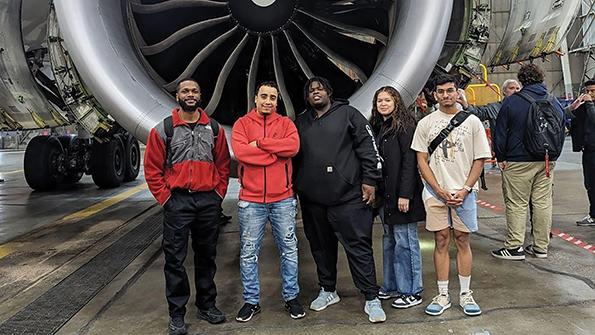This article is published in Aviation Week & Space Technology and is free to read until Jun 08, 2024. If you want to read more articles from this publication, please click the link to subscribe.
Opinion: Building And Keeping The Best Aerospace Talent

Members of the Vaughn College AMC team (from left): Ayoub Jdahim, Enrique Cashier, Casseem Stephenson, Luz Brito and Kowshik Noor.
Are you searching for new entry-level talent and thinking, “Where did everyone go?” The talent is there—you just need to know where to look and to make investments in relationships with institutions and organizations that ensure a long-term pipeline.
The COVID-19 pandemic seemed to change everything. In 2019, workforce demand was already beginning to challenge the industry, and then the world shut down. As we continue to emerge from the pandemic’s impacts and the lingering effects on the supply chain disruptions in both staffing and materials, unemployment is still low, and the face of the workforce is changing. According to the Congressional Budget Office, the U.S. workforce will grow older on average until 2054. And because the country’s population growth is slowing, immigrants will be a primary source of new workers.
When I speak to companies, I encourage them to look beyond their traditional methods for reaching the next generation of employees, particularly the colleges and training institutions that they typically use to fill their pipelines for everything from technicians to engineers. I suggest they look to underrepresented populations that have not been exposed to the life-changing trajectory a career in aviation and aerospace offers.
At institutions such as Vaughn College, a federally designated Hispanic-Serving Institution in New York City with more than 70% of students from underrepresented backgrounds as well as first-generation college students and first-generation Americans, students and families are eager for career pathways that provide long-term professional roads to achieving the American dream. The most significant barrier to reaching these students at an early age is awareness, closely followed by the financial means to afford the education and skills training to set them on those paths.
Across the country, Minority-Serving Institutions—including Historically Black Colleges, Hispanic-Serving Institutions, Asian American and Pacific Islander Institutions, and Tribal Colleges—are historically underfunded, despite the contributions they make. Nonetheless, these institutions produce incredible outcomes for the students they serve.
At Vaughn, 98% of students are employed or continuing their education within one year of graduation, 78% of them in their chosen field. Partnerships with industry—such as apprenticeships, internships and site visits—are the key to students’ success. One outside-the-box idea is the relationship Vaughn has with PSA Airlines, which provides financial and personnel support for the Aerospace Maintenance Competition (AMC) team. Over the past year, PSA staff personally coached our students, and we just had our best showing ever among 90 teams in the AMC at MRO Americas in Chicago. This type of engagement not only allows our students to grow their skill sets and to be better equipped when they join the industry, but it also allows our partners to see potential employees in action.
Another opportunity that goes beyond the traditional recruitment methods is an initiative kicked off this semester with longtime supporter Atlas Air and its Women’s Network in a semester-long mentorship program. Handpicked mentors from Atlas provided guidance, networking and site visits for students in a variety of sectors, such as law, finance and operations, and exposed students to aspects of an airline that they may not have otherwise considered.
The next step is retaining all that great new talent. Over the years, students have shared with me stories about their first professional positions and what they would change if they could. First, they would like to see other people like them at the company they join. This could mean greater diversity in gender, age, ethnicity or other traits that provide a sense of belonging. This diversity also gives them a vision of roles to which they could aspire. Second, many of our engineering students join companies outside of the Northeast U.S. Graduates want to understand the culture of the company they are joining and feel welcome as a person who may come from a different background than most other employees.
Past graduates have sometimes felt they needed to prove themselves repeatedly because of their ethnicity or gender. We counsel students to seek out support systems to help them navigate these barriers and be successful. Solid orientation, mentorship and sponsorship programs that can advocate for such employees can serve as support systems for new professionals.
Sharon B. DeVivo is president of Vaughn College of Aeronautics and Technology in Flushing, New York.
